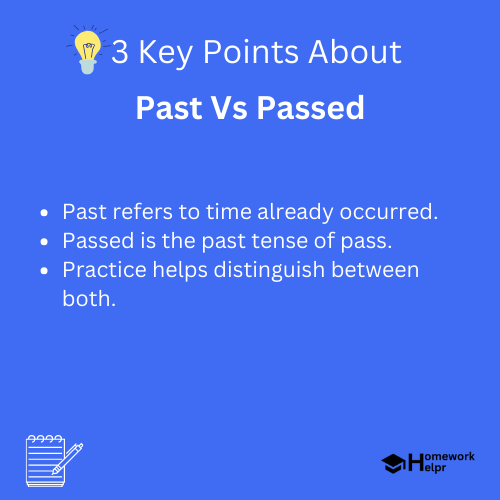📝 Summary
In English, the words past and passed often create confusion due to their similar sounds but distinct meanings. The term past serves as a noun, adjective, or preposition, referring to time that has already occurred, while passed is a verb, the past tense of “pass,” indicating an action that has been completed. Understanding their grammatical roles is essential for effective communication. By recognizing their uses and avoiding common mistakes, one can improve their overall command of the English language.
Understanding the Difference: Past vs Passed
The English language can sometimes be quite confusing, especially when it comes to similar sounding words. Two such words that often create a lot of confusion are past and passed. Despite their similar pronunciation, they have distinct meanings and uses in sentences. In this article, we will explore past and passed, their grammatical roles, and how to use them correctly.
What is ‘Past’?
The term past is primarily used as a noun, adjective, and sometimes as a preposition. As a noun, it refers to a time that has already occurred. For example, when we say “in the past,” we are referring to events that happened before the present time.
- Noun Usage: “She reminisced about the past.”
- Adjective Usage: “He is a past champion.”
- Preposition Usage: “Drive past the bank to get to the school.”
In all these usages, the common thread is a reference to something that is not currently happening or something that has already been completed. Understanding this will help you recognize when to use “past” appropriately.
Definition
Noun: A part of speech that refers to a person, place, thing, or idea.
Adjective: A word used to describe a noun.
Preposition: A word that shows the relationship between a noun or pronoun and other words in a sentence.
What is ‘Passed’?
On the other hand, passed is a verb – specifically, it is the past tense of the verb pass. To pass means to move past someone or something, to go by, or to transfer something to another person. You can think of “passed” as an action that has already taken place.
- Transitive Verb Usage: “She passed the ball to her teammate.”
- Intransitive Verb Usage: “He passed quickly by the store.”
- Idiom Usage: “Time passed slowly during the long lecture.”
Since “passed” reflects an action that has been completed, it‚’ always linked to a subject that is doing something in a past context.
Definition
Verb: A part of speech that describes an action, occurrence, or state of being.
Transitive Verb: A verb that requires an object to receive the action.
Intransitive Verb: A verb that does not require an object.
Examples to Clarify the Difference
Let‚’ look at some examples to further clarify the difference between past and passed.
Examples
1. When I look at my old photographs, I often think about the past and the memories I cherish. 2. Yesterday, I successfully passed my math exam. 3. She wrote a book about her experiences in the past, which inspires many readers today. 4. The runner passed the finish line with great speed.
Common Mistakes Students Make
It is common for students to interchange the two words due to their similar pronunciations. Here are some typical mistakes:
- Using “passed” when you mean the time has gone by: “In my childhood, I enjoyed many activities in the passed.”
- Using “past” as an action: “I past the ball to him yesterday.”
These mistakes can lead to confusion in writing and speaking, so practicing their correct usage can significantly enhance one‚’ language skills.
Fun Fact About Past and Passed
❓Did You Know?
The word “past” originates from the Latin word “pƒÅstus,” which means “to feed” or “to graze.” It shows how the concept of time can also connect to a sense of nourishment through experiences.
Practice Makes Perfect
The best way to master the difference between past and passed is through practice. Here are some practical steps:
- Read: Engage with various texts and pay attention to the contexts in which both words are used.
- Write: Create sentences or short paragraphs incorporating both terms correctly.
- Speak: Use both words in conversation to become more comfortable with their meanings.
Consider doing exercises that ask you to choose the correct word depending on the context. This could make learning fun and help reinforce your understanding!
Conclusion
In conclusion, understanding the distinction between past and passed is crucial for effective communication. Recognizing past as a reference to times or events that have already happened, and passed as an action that has been completed, will enable you to construct better sentences.
With clarity on their usages and through continuous practice, you will be able to avoid common mistakes and enhance your grasp of the English language!

Related Questions on Past Vs Passed
What are the uses of “past”?
Answer: Past can be a noun, adjective, or preposition.
What is the grammatical role of “passed”?
Answer: Passed is the past tense of the verb pass.
How can mistakes with these words be avoided?
Answer: Practice and understanding usage clarify the differences.
What is a fun fact about “past”?
Answer: The word originates from Latin meaning “to graze.”
